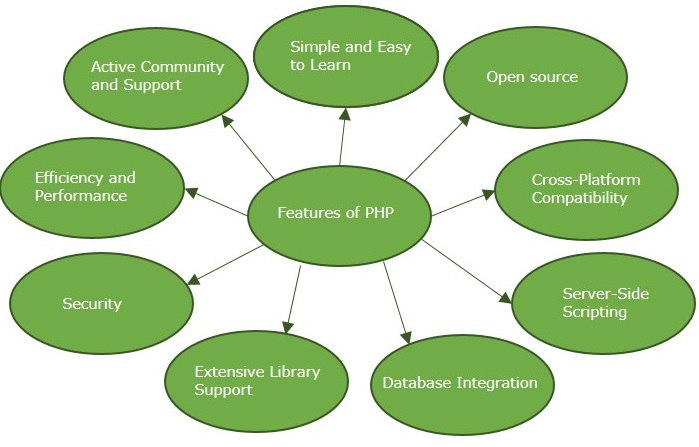What is PHP?
PHP, which stands for Hypertext Preprocessor, is a widely-used open-source server-side scripting language that is especially suited for web development and can be embedded into HTML.
Key Features of PHP:
- Dynamic Websites: PHP enables the creation of dynamic websites that can interact with databases and perform various tasks based on user input.
- Open Source: PHP is free to use and has a large community of developers contributing to its growth and improvement.
- Platform Independence: PHP runs on various platforms such as Windows, Linux, Unix, and macOS.
Advantages of PHP:
- Easy to Learn and Use
- Supports Various Databases
- Efficient Performance
Common Uses of PHP:
- Creating Dynamic Web Pages
- Form Handling
- Content Management Systems
- E-commerce Websites
Overall, PHP is a versatile and powerful scripting language that is widely used in web development for its flexibility, compatibility, and ease of integration with other technologies.
Features of PHP
PHP, a widely-used open-source scripting language, offers a plethora of features that make it a popular choice for web development. Below are some prominent features of PHP:
1. Simple and Easy to Learn
One of the key advantages of PHP is its simplicity and ease of learning. Its syntax is similar to C and Java, making it accessible for developers from various backgrounds.
2. Server-Side Scripting
PHP is designed for server-side scripting, meaning that PHP code is executed on the server, generating HTML content that is then sent to the client's browser.
3. Platform Independence
PHP is platform-independent, making it compatible with various operating systems such as Windows, macOS, Linux, and UNIX.
4. Integration Capabilities
PHP can easily integrate with other technologies such as HTML, CSS, JavaScript, and databases like MySQL, making it a versatile choice for web development.
5. Open Source and Community Support
Being open source, PHP has a vast community of developers who contribute to its development, provide support, and create various frameworks and libraries to enhance its functionality.
6. Security Features
- PHP offers built-in security features that help developers prevent common security vulnerabilities such as SQL injection and cross-site scripting (XSS).
- Frameworks like Laravel provide additional security measures to protect web applications.
7. Scalability and Performance
- PHP applications can easily scale to handle increasing traffic and workload demands.
- With features like opcode caching and efficient memory management, PHP can deliver high performance for web applications.
These features collectively make PHP a robust and flexible choice for developing dynamic websites and web applications.
